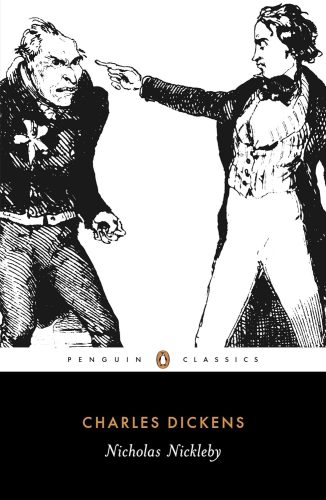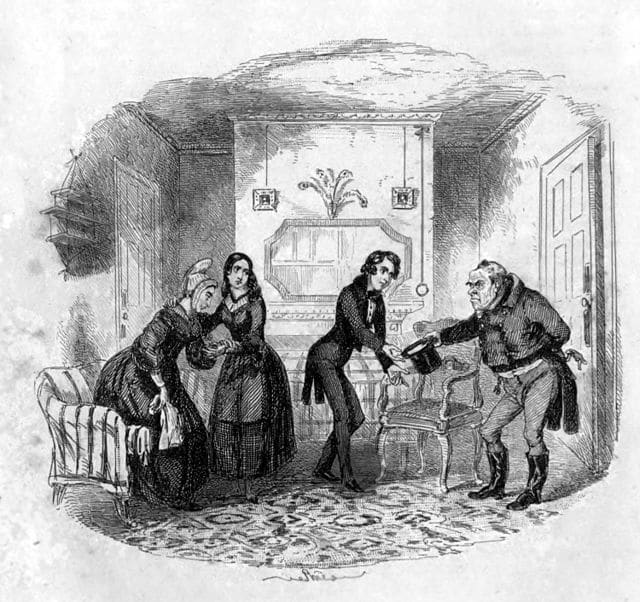 “Such is hope, heaven’s own gift to struggling mortals…”
“Such is hope, heaven’s own gift to struggling mortals…”
Author: Charles Dickens
After the death of young Nicholas’ errant father, the Nickleby family is cast into poverty, at the mercy of Ralph Nickleby, their only remaining relative. Ralph is a scheming uncle who finds love in money, not family. True to Dicken’s approach, the story unfolds almost as a fictional biography, highlighting the injustice of society and the importance of character over station.
At Ralph’s arrangement, Nicholas is sent to a cheap school for boys, where he will work to support his mother, a ridiculous woman who spends her life toadying to the wealthy and influential. Kate, Nicholas’ sister, is sent to work with a contentious dressmaker. But Uncle Ralph has reasons to use both his niece and nephew, and his supposed kindness has a steep price.
As the story continues, both Nicholas and Kate are beset by evil misadventure and villainous characters in a world intended to wreak harm on the innocent and beleaguered. But Nicholas is made of stronger stuff and soon arms himself with powerful friends. There will be a beating, two funerals, shocking secrets, and a heartbreaking trade in marriage before the story rumbles to a conclusion, mixing Dicken’s comedic wit and sarcasm with social commentary and moments of poignancy and bliss.
I’ve been reading Dickens since high school, when I discovered that David Copperfield is one of my all-time favorite books. Dickens’ has a way with words and descriptions, bringing places and characters alive. He may use sarcasm to bring certain types to life, but he does this with precision. We know just these kinds of people who lurk in the shadows of his world, from the chatty Mrs. Nickleby with her pretentious self-centeredness, to the despicable money lender Gridle with his bottle-green wedding clothes, to the unforgettable school master, the cruel Wackford Squeers. Both the names and the attributes create a comedic testimony to villainy that is nonetheless deep and insightful. Dickens may paint absurdity and humor over these leering people, but the innate nature of their evilness, the insipidity of their moribund spirits, comes through. It’s a lesson in an unforgettable wrapping, and while we may laugh, we also think – look how ridiculous evil is, how people sell their very souls for cruelty and frivolity. These insights are what continues to make Dickens relevant, even hundreds of years later. The portraits are still more than recognizable, the types walking our streets and bustling into our houses and work cubicles today.
Another attribute of Dickens’ novels is the episodic nature, which remains true in Nicholas Nickleby. The story, like life, has many portions and a HUGE cast of characters who do all interrelate in the end. At times, however, it can be difficult to follow because we lose track of the main action, distracted by side stories, such as Nicholas’ career in the theater (a bit that I honestly found rather boring). Dickens himself was in the theater, and portions of his stories, including this one, have a semi-auto biographical nature. However, this can take us out of the action when Dickens gets excited about the theater world and the personalities who live and breath there. If you’re not into theater, you’ll find yourself disappointed when one of those long chapters opens.
But eventually, the plot tightens and everything coalesces. Nicholas faces his uncle, this time with proof about his evil schemes. By this point, though, there have been some serious losses and while the ending is “happy,” as in life, there are traumas that cannot be forgotten or expunged, including the lonely grave of a boy rescued and befriended by Nicholas.
Everything here is melodramatic and yet, oddly realistic, in that unique, gritty, dirty London Dickensian way. The situations may flare, the villains with their hilarious names may cackle and bray, and the comedy may for a moment trump the real-life social issues Dickens is addressing (such as cheap schools at the time that took and abused illegitimate and unwanted children, sending many of them to an early grave.) Yet, the underpinning of a harsh reality that still has beautiful moments (including good people who prove their characters through their actions) remains strong. The story may not be entirely real, but the situations that undergird them most definitely are, and while Dickens uses his own theatrical nature to keep us entertained (and from becoming too depressed) his point still shines, centuries later. And, indeed, this book was effective at creating reform, starting with schools that abused children.
While Nicholas Nickleby wasn’t my favorite Dickens novel (I honestly could have done with less theater time), it was still prime Dickens at his best. At turns beautiful, funny, tragic, and thoughtful, Dickens captures the experience of life. He captures the good and the bad: the killers and those who sacrifice themselves, the selfish and the lovers, the rich and the poor, and he brings to life the inner hearts of people and their motivations in a way that goes beyond a simple place in time. His message still stands, still resonates, and his characters’ misadventures still entertain and call us to action. Highly recommended.
– Frances Carden
Follow my reviews on Twitter at: https://twitter.com/xombie_mistress
Follow my reviews on Facebook at: https://www.facebook.com/FrancesReviews
- Book Vs Movie: The Shining - April 6, 2020
- Thankful For Great Cozy Mysteries - December 13, 2019
- Cozy Mysteries for a Perfect Fall - October 20, 2019



